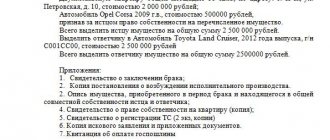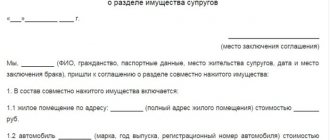Free legal consultation by phone:
8
According to the law, the property of spouses during marriage is common, if there is no documentary evidence of the ownership of housing by one of them (will, donation). Registration of divorce proceedings is often accompanied by the division of common real estate, which is confirmed by an agreement on the division of property. There are often cases when citizens, after the passage of time, want to challenge a document. This publication will help you become familiar with the conditions and procedure for challenging.
Use of standard forms and incompetence of the notary
The legislation of the Russian Federation does not provide for any standard agreements for these relations. Meanwhile, notaries, who are in charge of certifying this type of agreement, use only three or four forms (this form is called in legal practice - “fish”), once developed in the depths of the local notary chamber and recommended for work as not risky. Unfortunately, when calculating risks in this case, only the interests of the notaries themselves are taken into account in the sense that in the event of unforeseen circumstances, the notary will not be able to make any claims.
INUSTA
Of course, notaries insist on using the forms they offer. In order to calculate the consequences of atypical conditions, a good knowledge of the material is required, you need to spend time, have good knowledge and, preferably, have personal judicial practice in this type of dispute. This is something that the average notary, as a rule, does not have.
As a result, the parties receive not what they need, but what is convenient for the notary. A classic example is that a notary requires, for a transaction that determines shares in a mortgaged apartment, the consent of the bank, which the bank usually issues under “draconian” conditions, or refuses certification if consent has not been given. Although by law such consent is not required!
The easiest way for a notary to state is that either you should agree with his standard form, or look for other more advanced specialists, or he will simply state that “it’s so wrong.” What to do in this case is up to you. Perhaps, after spending some time, you will be able to find “your” notary, and this will be the best option. The alternative is to insist on your own, and if the notary assures that it is impossible to satisfy your requirements, demand a written justification for the refusal to perform notarial acts.
INUSTA
Question:
The plot of the case: the creditor has the right to claim against the debtor for a large sum of money established by a court decision. The court decision to collect money has not been implemented for a long time. The debtor has no property and income. The debtor was married from 2002 until March 2021. In fact, the debtor continues to live together with his “former” spouse. During the marriage, movable and immovable property (22 items) were registered in the name of the debtor's spouse. In May 2021, the bailiff orally informed the creditor that, according to the debtor’s spouse, by May 2021, the marriage with the debtor-spouse was dissolved, a marriage contract was not concluded, and the spouses’ property was not divided. The creditor filed a claim with the debtor and the former spouse of the debtor to divide the property of the spouses, allocate a share of the property of the debtor spouse, and foreclose on the share of the property of the debtor spouse. The defendants (the debtor and the former spouse of the debtor) presented at the first court hearing an Agreement on the division of the common property of the spouses, drawn up on July 15, 2015 in simple written form (not requiring notarization as of July 15, 2015 - Part 2 of Article 38 of the Family Code RF), according to which all property registered in the name of a spouse who is not a debtor belongs to this spouse, and the debtor spouse owns only 1/2 of the right to the apartment.
Does the creditor have the right to challenge (demand to invalidate) the Agreement on the division of property of the spouses dated July 15, 2015 on the grounds provided for by the Civil Code of the Russian Federation, for example, on the basis of a transaction on extremely unfavorable terms (bondage) of the transaction - Article 179, Part 3 of the Civil Code of the Russian Federation , taking into account the circumstances that the creditor is not a party to such a transaction, and the former spouse and the debtor spouse will most likely object to the claim and declare the validity of such an agreement dated July 15, 2015?
Contents of the statement of claim
If the statement of claim is drawn up incorrectly, this may delay the consideration of the case.
Therefore, it is important to record all key information in the document.
The claim must include the following items:
- The name and address of the location of the judicial authority considering the case.
- Information about the plaintiff and defendant.
- Amount of claim.
- A list of circumstances that allow the plaintiff to recognize the signed document as invalid.
- A complete description of all aspects of the situation in which the defendant violated the legal rights of the applicant.
- The plaintiff’s demands to the defendant (to declare the agreement completely invalid, to make adjustments to the clauses of the document, etc.).
If the applicant believes that it is necessary to provide other information, they must be recorded in the statement of claim.
Answer:
According to established judicial practice, the demand of the creditor of the debtor - one of the spouses - to invalidate the agreement on the division of property of the spouses is declared, most often, on the following grounds:
- In accordance with Article 170 of the Civil Code of the Russian Federation, an imaginary transaction, that is, a transaction made only for show, without the intention of creating legal consequences corresponding to it, is void. The imaginary nature of the transaction is associated with the understanding of the parties that this transaction does not bind them and they have no intention of fulfilling it or demanding its execution.
The Samara Regional Court, in its Ruling dated April 12, 2011 in case No. 33-2883, established, firstly, that the borrower’s wife was not aware of the debt of the spouse to the creditor, which was also confirmed by a witness at the court hearing, and secondly, at the time of the conclusion of the agreement on the division of the common property of the spouses (05/28/2010), no prohibitions or restrictions on the property specified in this agreement were registered, the court came to the conclusion that the spouses, exercising their rights granted to them by law, disposed of the property belonging to them at their discretion , having concluded the corresponding transaction - an agreement on the division of the common property of the spouses, and no evidence was presented that the specified agreement is an imaginary transaction.
At the same time, the court found unfounded the creditor's arguments that the agreement on the division of property was concluded by the spouses during the period when the creditor's statement of claim against the borrower-spouse to collect the amount of the debt was in court, since the statement of claim to collect the amount of the debt was actually received by the court on May 19. 2010 (that is, before the conclusion of the agreement), however, by a court ruling dated May 24, 2010, it was left without movement. The case was accepted by the court only on 06/08/2010, and there is no evidence in the case materials that before this date the spouses knew about the creditor’s application to the court to collect the amount of the debt.
Under such circumstances, the court did not satisfy the plaintiff’s request to invalidate the agreement on the division of property of the spouses and to apply the consequences of the invalidity of a void transaction.
- According to paragraph 3 of Article 179 of the Civil Code of the Russian Federation, a transaction on extremely unfavorable conditions, which a person was forced to make as a result of a combination of difficult circumstances, which the other party took advantage of (a enslaving transaction), can be declared invalid by the court at the request of the victim.
Meanwhile, based on the legal definition of the servitude of the transaction, the mere deviation under the terms of the agreement on the division of jointly acquired property from the equality of the spouses’ shares in jointly acquired property does not indicate the conclusion of an agreement on extremely unfavorable terms for the party and is not sufficient evidence for recognizing the disputed enslaving transactions (see Determination of the Moscow City Court dated March 24, 2011 in case No. 33-7983).
And the Moscow City Court in the Appeal ruling dated May 26, 2015 in case No. 33-17897/2015, examining the creditor’s arguments that the agreement between the spouses (one of whom is the debtor) puts one of the spouses in an extremely unfavorable position and infringes on the rights and legitimate interests bank, as a creditor, the purpose of the contested transaction is to divert the property from foreclosure on it according to the monetary obligation of the spouse to the bank established by a court decision, since there is a disproportionality in the division of the common property of the spouses, and therefore the creditor is deprived of the opportunity to foreclose on the spouse’s share in the common property spouses, came to the conclusion that there are no grounds for recognizing the agreement on the division of the common property of the spouses as invalid, since it meets the requirements established by law, the subject of the agreement contains detailed characteristics of the divided property, the agreement was signed by the parties, which indicates that the will of the parties for the occurrence of the foreseen the agreement on the consequences (including on the size of shares after the division) was voluntary.
- By virtue of the first paragraph of paragraph 1 of Article 10 of the Civil Code of the Russian Federation, the exercise of civil rights solely with the intention of causing harm to another person, actions in circumvention of the law for an unlawful purpose, as well as other deliberately dishonest exercise of civil rights (abuse of law) are not allowed.
In case of non-compliance with this prohibition, the court, on the basis of paragraph 2 of Article 10 of the Civil Code of the Russian Federation, taking into account the nature and consequences of the abuse committed, denies the person protection of his rights in whole or in part, and also applies other measures provided for by law.
According to paragraph 1 of Article 168 of the Civil Code of the Russian Federation, a transaction that violates the requirements of a law or other legal act is voidable unless it follows from the law that other consequences of the violation not related to the invalidity of the transaction should be applied.
An agreement, during the conclusion of which there was an abuse of law, is subject to recognition as invalid on the basis of Articles 10 and 168 of the Civil Code of the Russian Federation upon the claim of a person challenging such an agreement, whose rights and legally protected interests it violates.
In this case, it was possible to find positive judicial practice.
The Sverdlovsk Regional Court (Appeal ruling dated April 30, 2015 in case No. 33-6173/2015) came to the conclusion that there are grounds for declaring the transaction illegal on the basis of bad faith of the parties to the agreement on the division of property when it was completed.
Having established that the debtor spouse caused losses to the creditor, the court in another case recovered an amount in favor of the creditor to compensate for losses, but this decision was not executed, the court noted that the spouse at the time of drawing up the agreement on the division of property had an obligation to pay the debt to the creditor, between However, the spouses, just two weeks after the court’s decision to collect the debt, on the eve of the court’s consideration of the issue of taking interim measures, signed an agreement on the division of property, which indicates that the agreement is aimed at removing the debtor’s property from seizure and recourse penalties, which indicates an abuse of right.
As for the possibility of the court declaring an agreement invalid at the request of third parties (in this case, the creditor), in practice, when resolving this issue, the provisions of paragraph 1 of Article 44 and paragraph 1 of Article 101 of the RF IC are applied by analogy: to an agreement on the division of property of spouses, one can use The same approach is that in relation to a marriage contract, an agreement on the payment of alimony - they can be declared invalid by the court in whole or in part on the grounds provided for by the Civil Code of the Russian Federation for the invalidity of transactions.
In general, in our opinion, despite the fact that the practice in this category of cases is not in favor of the creditor, the presence of the entire body of evidence may indicate bad faith actions of the spouses when concluding agreements on the division of property of the spouses, which are aimed at infringing on the legal rights and interests of the creditor , and serve as a basis for invalidating such an agreement:
- at the time the bailiff carried out enforcement actions (foreclosure, seizure of the property of the debtor spouse), the agreement on the division of property was not signed and submitted;
- the division of the property of the spouses by agreement was made after the occurrence of obligations to the creditor, and such division is extremely unequal;
- After the division of the spouses’ property has been completed, the debtor spouse actually continues to use the property, which, according to the agreement, has been transferred to the ownership of the second spouse.
Lisitskaya O.S.,
expert in civil, corporate and labor law
Sample application for declaring an agreement for the division of property illegal
This claim is filed with the judicial authorities at the place of residence of the defendant. Russian legislation makes no exceptions in this regard. If you do not have the opportunity to travel to court hearings in another locality, write out a power of attorney in the name of your representative (civil law lawyer).








